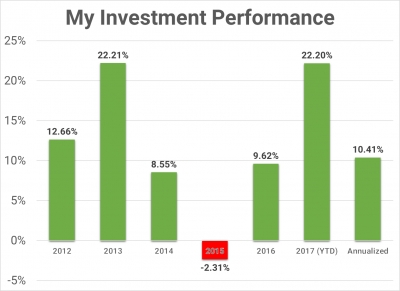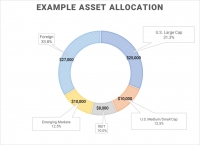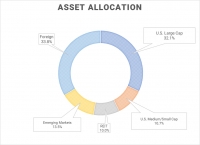Friday, 30 June 2017 06:41
How to calculate your internal rate of return using Google Sheets
Written by Jerry H.
The internal rate of return (IRR) is the dollar-weighted return of a particular investment. It is what I consider to be gold standard measurement of your investment's personal performance. The calculation for IRR looks like a pain in the ass. Luckily, there is a spreadsheet function that calculates this easily for you, and I just so happen to be awesome at creating spreadsheets.
Published in
Investing
Thursday, 29 June 2017 07:41
How diversifying your asset allocation smooths out the ride - a real life example
Written by Jerry H.
I have talked before about diversifying your portfolio by targeting an asset allocation that is right for you. I also recommended a way to balance it across multiple accounts, with the goal of keeping as few funds in each account as you can. When you do this, each account by itself is NOT very diversified, and subject to a relatively large amount of volatility. However, if you take ALL of the accounts together, the overall volatility decreases without much sacrifice in the performance.
Published in
Investing
Wednesday, 28 June 2017 14:37
Achieving your target asset allocation across multiple accounts and investment vehicles
Written by Jerry H.
Trying to achieve your target asset allocation across multiple accounts can be quite difficult. It can feel even more so when you consider that each investment vehicle has its own tax consequences. For instance, you may own pre-tax investment accounts, which can include your 401(k), 403(b), individual 401(k), and traditional IRA. You might also own post-tax investment accounts, so called 'Roth' accounts which include the Roth IRA and Roth 401(k) or 403(b) accounts. If all of these are maximized, you may also start placing investments in a taxable brokerage account, like I do. You start accumulating a lot of investment…
Published in
Investing
Tuesday, 27 June 2017 13:13
How to choose a target asset allocation for your investments
Written by Jerry H.
When it comes to choosing asset classes in your investment portfolio, most of us know that diversification leads to a better return vs risk profile by reducing volatility without sacrificing returns. That is the premise of investing in index funds instead of picking individual stocks. However, even among different index funds, depending on the asset class they represent, there can be high volatility as well (think emerging market or small cap funds). Thus, it is also important to diversify across different asset classes. I will show you my own personal asset allocation and how I decided on it.
Published in
Investing
Saturday, 17 June 2017 07:08
Avoiding underpayment penalties for federal taxes - the safe harbor rule
Written by Jerry H.
As a proponent of owing federal taxes during filing season as opposed to receiving a refund, I have to be wary to avoid penalties for underpaying taxes along the way. Federal taxes are meant to be a 'pay as you earn' system where you should be "safe harbor" tax law, which are the conditions I need to satisfy in order to NOT owe penalties for underpayment. These can be found in chapter 4 of Publication 505 of the IRS website, which I will describe in more detail in this post.
Published in
Taxes
Tuesday, 13 June 2017 07:14
An argument for owing federal taxes instead of receiving a tax refund
Written by Jerry H.
If given the following options, which would you choose? Would you rather... offer the federal government an interest-free loan for up to 16 months, or receive an interest-free loan from the government for up to 16 months. The heart of this choice is played out every year, when individuals choose their allowances on their W4 form which determines how much taxes to defer for federal taxes. Withhold more than you owe - you will get a tax refund. Withhold less than you owe - you will have to pay the amount owed. Every year when it comes time to file…
Published in
Taxes
Page 3 of 4





